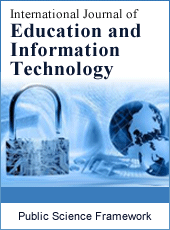International Journal of Education and Information Technology
Articles Information
International Journal of Education and Information Technology, Vol.2, No.4, Aug. 2016, Pub. Date: Aug. 5, 2016
The Use of Internet by Information Professionals: A Competitive Intelligence Approach
Pages: 19-27 Views: 5707 Downloads: 1897
[01]
Chioma Euriel Uzohue, Nigerian Institute of Medical Research, Yaba, Nigeria.
[02]
Japheth Abdulazeez Yaya, Nigerian Baptist Theological Seminary, Ogbomoso, Nigeria.
This paper examines the use of internet by information professionals in a competitive intelligence approach thereby producing and disseminating active information for tactical and top executive managers for decision making. The Internet which is part of information technologies is often used in competitive intelligence processes as a tool in gathering and analyzing raw information that will produce intelligence to give the organizations, libraries and other information centre a competitive advantage over the others. The paper aims to provide an overview of how the internet can be used by information professionals using competitive intelligence approach to support decision makers in various levels of managers in an organization. It focuses on the use of internet as a tool in supporting intelligence gathering using competitive intelligence approach and sources, involvement of information professionals using competitive intelligence in gathering, documenting, storing and retrieval systems. The paper further discusses the use of internet by information professional to produce raw information in intelligence activities. Emphasis was paid to the use of internet to support intelligence activities, the role and value of internet, the sources and search engines used by the information professionals, the role of information professionals in competitive intelligence processes. It concludes by emphasizing that Information professionals remained relevant to the organizations and with competitive intelligence skills acquired, they can adopt a creative and unique method of retrieving information from the internet and use such to promote the image of their organization as well achieve its stated goals.
Internet, Information Professionals, Competitive Intelligence, Library and Information Sciences, Knowledge Management and Information Retrieval
[01]
Ahmad, P. & Yaseen, M. (2009). The role of the library and information sources professional as managers: A competitive analysis. Electronic Journal of Academic and Special Librarians, 10 (3), np.
[02]
Capron, H. & Johnson, J. (2004). Computers; Tools for an Information Age (complete edition). New Jersey: John Wiley
[03]
Carbo, T. (2000). The global information highway in the 21st century. International and Library Review, 32, 237-250.
[04]
Chisita, C. T. (2011). Information Science Module LIS101. Havare: Zimbabwe Open University
[05]
Cook, M. & Cook, C. (2000). Competitive Intelligence. London: Kogan Press.
[06]
Erdelez, S. & Ware, N. (2001). Finding competitive intelligence on Internet start-up companies: a study of secondary resource use and information-seeking processes. Information Research, 7 (1), np. Available at: http://InformationR.net/ir/7-1/paper115.html
[07]
Eyitayo, O. T. (2008). Internet Facilities and the status of Africans connectivity: Information and Knowledge Management in the Digital Age, Concept, technologies and African perspectives. Ibadan: Print marks Ventures.
[08]
Haliso, Y. & Ogungbeni, J. I. (2014). Internet VS Library: Coping Strategies for Academic Librarians in Lagos State, Nigeria. Information and Knowledge Management, 4 (1), 59-64, Available online at http://www.iiste.org ISSN 2224-5758 (Paper) ISSN 2224-896X (Online).
[09]
Heavenga, J. & Botha, D. (2000). Developing Competitive Intelligence in the knowledge based Organization. Available online at http://www.sveiby.com/artcles.htm.
[10]
Hutchinson & Sawyer S. (2000). Computers, Communications and Information Core Version. Boston: Mcgrawhill
[11]
Kahaner, L. (1996). The Basics of Competitive Intelligence http://www.kahaner.com/
[12]
Kahaner, L. (1997). Competitive intelligence: how to gather, analyse and use information to improve your business to the top. New York: Touchstone.
[13]
Khan, SA & Bhati R (2012). Application for social media in marketing of Library and Information services: A case study from Pakistan. Available online at http://www.webology.org/2012/v9ni/a93.html
[14]
King, L. (1998). Knowledge First Management and the 21st century organisations: The role of the information professional (online).
[15]
Marshal, A., Fisher, B., Moulton, L. & Piccalli, R. (1996). Competencies for Special Librarians of 21st Century. Available online at http://www.sla.org/content/sla/professional/meaning/comp/cfm.
[16]
Miller, J. (1996). Information Science and Competitive Intelligence: Possible Collaborators? Bulletin of American Society for Information Science, 11–13.
[17]
Moon, M (2000). Effective use of information and competitive intelligence. Available at http://www.sla.org/content/shop/information/infoonline/2000/feb00/moon.cfm
[18]
Oder, N. (2001). The competitive intelligence opportunity. Library Journal, 42–44.
[19]
Pellissier, R. & Nenzhelele, T. E. (2013). Towards a universal competitive intelligence process model. South African Journal of Information Management, 15 (2), 512-559. Available at http://dx.dio.org/10.4102/sajimvl512.559
[20]
Pistorius, C. W. I (2001). Has South fallen into a competitiveness trap? South African Journal of Science, 97, np.
[21]
Society of Competitive Intelligence Professionals (SCIP) (2003). Competitive Intelligence. Available online at http://www.scip.org.
[22]
Weiss, A & Naylor, E (2010). Competitive Intelligence: How independent information professionals contribute to organizational success. Bulletin of the American Society for Information Science and Technology, 37, 30–34.
[23]
Yaya, J. A., Achonna, A. U. & Osisanwo, T. (2014). Competitive intelligence: A tool for effective job performance in academic library. Sky Journal of Educational Research, 2 (4), 020-027. Available online http://www.skyjournals.org/SJER

ISSN Print: 2381-7410
ISSN Online: 2381-7429
Current Issue:
Vol. 5, Issue 1, March Submit a Manuscript Join Editorial Board Join Reviewer Team
ISSN Online: 2381-7429
Current Issue:
Vol. 5, Issue 1, March Submit a Manuscript Join Editorial Board Join Reviewer Team
| About This Journal |
| All Issues |
| Open Access |
| Indexing |
| Payment Information |
| Author Guidelines |
| Review Process |
| Publication Ethics |
| Editorial Board |
| Peer Reviewers |


